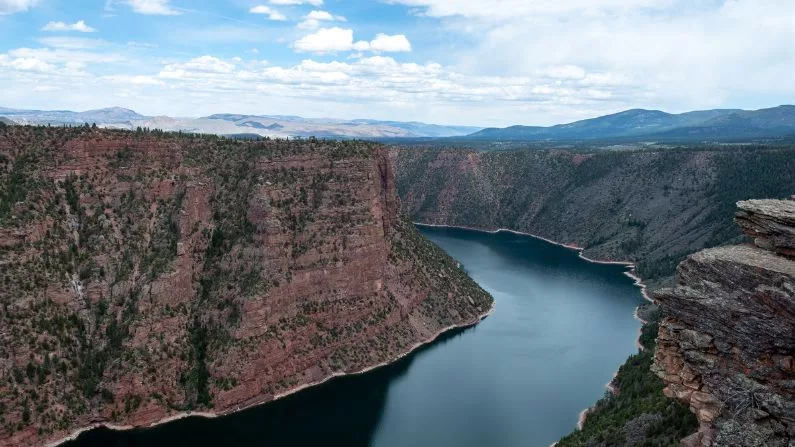This story comes through a content-sharing partnership with Wyoming Public Media.
A grinning fisherman often needs two hands to hold a massive lake trout on a sunny day at the Flaming Gorge Reservoir, which straddles the Wyoming-Utah border. Jim Williams has been a guide here for more than 30 years, and said some of the best trophy fish in the Rockies call these waters home.
“I have a lot of clients over the years on the boat that on one trip or another will say, ‘That’s the biggest fish I’ve ever caught in my life,”’ he said. “There’s a lot of satisfaction from that.”

A client of Jim Williams holding a lake trout. (Courtesy Of Jim Williams)
But this habitat has seen some drastic changes in a short amount of time. In the past two years, the reservoir has dropped to its lowest level since the 1980s. Marinas and river channels are running dry.
“There’s fewer places to launch a boat, and we’re going to probably lose another one this year,” Williams said. “Unless we get a whole lot of water coming down and they hold it.”
One of Flaming Gorge’s primary uses is storage for the rest of the Colorado River Basin. The Bureau of Reclamation, which oversees federal water management, released an extra 500,000 acre feet of water from the reservoir last year. That’s a lot of water sent downstream – roughly what a million households use per year. Williams expects more releases in the near future.
“If I had a young son right now that was 10 or 12 years old, I don’t know that I’d want to get him really hooked on fishing,” he said. “Not just because of the drawdown on this lake, but this water issue we’re talking about West-wide.”

Water levels at Flaming Gorge Reservoir in the past 24 months. (Courtesy Of The Bureau Of Reclamation)
Recent releases from Flaming Gorge are primarily to prop up Lake Powell, the nation’s second-largest reservoir. Hydropower from the Glen Canyon Dam is becoming increasingly threatened there because Lake Powell’s water levels are so low. The Mountain West’s wet winter so far also isn’t nearly enough to begin reversing the trend.
“It’s great that we’ve had this snowfall that we’ve had,” said the Bureau of Reclamation’s Valerie Deppe. “But again, it’s just the tip of the iceberg.”
Other upstream reservoirs, like Blue Mesa in Colorado or Navajo in New Mexico, have also seen extra drawdowns in recent years and could be tapped again.

Current major reservoir levels in the Upper Colorado River Basin. (Courtesy Of The Bureau Of Reclamation)
How to maintain Lake Powell and Lake Mead – the nation’s largest reservoir – has been the subject of intense negotiations in recent weeks. The seven states in the Colorado River Basin, from Wyoming to California, have been asked to agree on a management plan to cut water use.
Jack Schmidt, who directs the Center for Colorado River Studies at Utah State University, said finding common ground is no easy task.
“It’s hard and it’s messy. It’s been hard and messy for more than 100 years,” he said.
Recently, six of the seven states – Wyoming, Utah, Colorado, New Mexico, Nevada and Arizona – agreed on a proposal to leave about 1.5 million acre-feet more water in Lake Mead in each of the next two years. But it doesn’t include the largest user on the river, California: the state the proposal asks to make the most cuts.
Schmidt said the proposal doesn’t require Wyoming and the three other Upper Basin states to make cutbacks at all.
“There’s essentially no commitment to reduce consumption in the Upper Basin at all,” he said. “There’s a suggestion to maybe do it, but there’s no commitment to do it.”
States like Wyoming and Colorado have argued that they don’t consume as much as downstream places and shouldn’t cut more. California, meanwhile, has its own plan that spreads out more of the conservation burden.
Schmidt worries the impasse could prevent the states from taking full advantage of a snowy winter that could improve the drought situation if managed well.
“Worst case is we just chug along and say, ‘Oh, we don’t really have to save this year.’ And then what happens if this is a one-off year, and next year we go back to being really dry,” Schmidt said.
Schmidt said every state in the Colorado River Basin needs to save water in the face of historic drought, climate change and rapid development across the region. It doesn’t bode well that a pilot program in the Upper Basin that would pay users, like farmers and ranchers, to conserve water has struggled to attract interest. Officials extended the deadline to apply by a month, to March 1, to conduct more outreach.
For now, what the Bureau of Reclamation can control is its reservoirs, like Flaming Gorge. Fishing guide Jim Williams and other recreationists understand that, but still feel powerless.
“We get what’s left. We are enjoying the leftovers and if our leftovers go away, we’ve got to adapt,” he said.
If states can’t agree on sufficient water cuts, the federal government says it will impose them.
This story was produced by the Mountain West News Bureau, a collaboration between Wyoming Public Media, Nevada Public Radio, Boise State Public Radio in Idaho, KUNR in Nevada, the O’Connor Center for the Rocky Mountain West in Montana, KUNC in Colorado, KUNM in New Mexico, with support from affiliate stations across the region. Funding for the Mountain West News Bureau is provided in part by the Corporation for Public Broadcasting.






